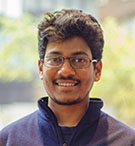
| Event Details |
|---|
|
Tuesday, February 10, 2015 Talk:
4:00 p.m., Avery 115
Reception:
3:30 p.m., Avery 348
|
Dr. Pratap Tokekar
Post-Doctoral Researcher, University of PennslyvaniaAbstract
A connected network of robots, sensors, and smart devices has the potential to solve grand challenges in domains such as agronomy, oceanography, and emergency response. Robots will form the “physical” layer of this network and collect data from hard to reach places at unprecedented spatio-temporal scales. A key challenge for roboticists is to design decision-making algorithms that enable optimal sensing and data collection. In this talk, I will present such algorithms for three types of problems: (i) How to cover complex environments using few sensors and robots? (ii) How to optimize the robots’ energy to enable long term operation? (iii) How to coordinate teams of robots and sensors? In the first part, we will focus on the algorithmic aspects of the Art Gallery Problem, a classical sensor placement problem. I will present a new formulation that guarantees a good view of convex objects in polygonal environments, despite self-occlusions. I will present bounds and approximation algorithms for placing minimum number of sensors for this new formulation. I will also present algorithms for robotic coverage and informative path planning problems. In the second part, I will describe techniques for efficient solar energy harvesting and planning energy-aware trajectories for collaborative aerial and ground robots. In the third part, I will present coordination algorithms for target tracking with robotic teams that respects the communication constraints between the robots. We will study these problems in the context of two practical applications: precision agriculture and autonomous monitoring radio-tagged fish in Minnesota lakes. Throughout the talk, along with theoretical results, I will present experiments conducted with autonomous boats in Minnesota lakes, wheeled robots operating on frozen lakes, and aerial robots operating in corn plots and apple orchards.
Speaker Bio
Pratap Tokekar is a Postdoctoral Researcher at the University of Pennsylvania. He obtained his Ph.D. in Computer Science from the University of Minnesota in 2014 and Bachelor of Technology degree in Electronics and Telecommunication from College of Engineering Pune, India in 2008. His research interests include algorithmic and field robotics, sensor networks, and computational geometry.